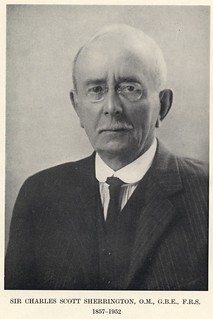- Correspondence Details
-
Sent From (Definite): Sir John Scott Burdon-Sanderson - Oxford
Sent To (Definite): Sir Charles Scott SherringtonDate: Approx. 23 Jul 1904 - Current Holder(s)
-
Holder (Definite): Woodward Library, University of British Colombia
On MacDougall, the Wilde Reader in Mental Philosophy. Invitation to Sherrington.
- No links match your filters. Clear Filters
-
Sent from
 Sir John Scott Burdon-Sanderson
Sir John Scott Burdon-Sanderson
Approx. 23 Jul 1904
Oxford
Description:'Dear Sherrington,
I have just become aware that you are to deliver a lecture here on Monday Aug. 11. I cannot be sure whether it is to be on Physiology or Experimental Psychology. I have also learned that you are to be the guest of our excellent Wilde Reader... Mr McDougall.
I write to ask whether if your entertainers permit, you will give us your company at luncheon after the lecture, i.e. at 1.30, or 1 o'clock in case it should suit you better. If it would suit you better to dine with [us?] tout niveux[sic].'
-
Sent to
 Sir Charles Scott Sherrington
Sir Charles Scott Sherrington
Approx. 23 Jul 1904
Description:'Dear Sherrington,
I have just become aware that you are to deliver a lecture here on Monday Aug. 11. I cannot be sure whether it is to be on Physiology or Experimental Psychology. I have also learned that you are to be the guest of our excellent Wilde Reader... Mr McDougall.
I write to ask whether if your entertainers permit, you will give us your company at luncheon after the lecture, i.e. at 1.30, or 1 o'clock in case it should suit you better. If it would suit you better to dine with [us?] tout niveux[sic].'
-
Quoted by
 T. Quick, 'Disciplining Physiological Psychology: Cinematographs as Epistemic Devices, 1897-1922', Science in Context 30 (4), pp. 423-474.
T. Quick, 'Disciplining Physiological Psychology: Cinematographs as Epistemic Devices, 1897-1922', Science in Context 30 (4), pp. 423-474.
Description:' As set forth in 1906, however, Sherrington's explanation of alternating 'antagonistic' reactions appealed not primarily to his own studies, but to the research of the physiologist and psychologist William McDougall. As with Macdonald, Sherrington knew McDougall personally. [note: 'For example, one of McDougall's first actions on his 1904 appointment to the Wilde Readership of Mental Philosophy at Oxford was to invite Sherrington to lecture there. See letter from J.S. Burdon-Sanderson to C.S. Sherrington dated July 23 [1904] (Sir Charles Scott Sherrington Fonds, 428).']'
'Sherrington's relationship with McDougall appears to have caused consternation within Britain's more mechanism-oriented community of experimental physiologists. For example, Sherrington's predecessor in the Waynflete chair, John Scott Burdon-Sanderson, wrote to the former shortly before his 1904 appearance, noting that he had 'just become aware that you are to deliver a lecture here' at the behest of McDougall, that he could not 'be sure whether it is to be on Physiology or Experimental Psychology', and requesting that Sherrington attend luncheon with him after the lecture. He further added, with something seemingly approaching sarcasm, 'if it would suit you... to dine with us tout niveux [sic].'' [note: 'i.e. 'on any level.' Letter from J.S. Burdon-Sanderson to C.S. Sherrington dated July 23 [1904] (Sir Charles Scott Sherrington Fonds, 428). On mechanistic tendencies within British physiological psychology see Daston 1978; Smith 2013, 45-49.'] Sherrington had spent the previous two decades building up a reputation as one of the most productive physiologists in Britain, and identified Oxford as a place in which he might further his own physiological goals (he had unsuccessfully sought appointment there in 1895. See Swazey 1969, 18-19). Burdon-Sanderson could thereby be sure that his expression of uncertainty regarding Sherrington's disciplinary commitments would be well attended to.'
Relevant passage from Burdon-Sanderson:
'Dear Sherrington,
I have just become aware that you are to deliver a lecture here on Monday Aug. 11. I cannot be sure whether it is to be on Physiology or Experimental Psychology. I have also learned that you are to be the guest of our excellent Wilde Reader... Mr McDougall.
I write to ask whether if your entertainers permit, you will give us your company at luncheon after the lecture, i.e. at 1.30, or 1 o'clock in case it should suit you better. If it would suit you better to dine with us tout niveux[sic].'







